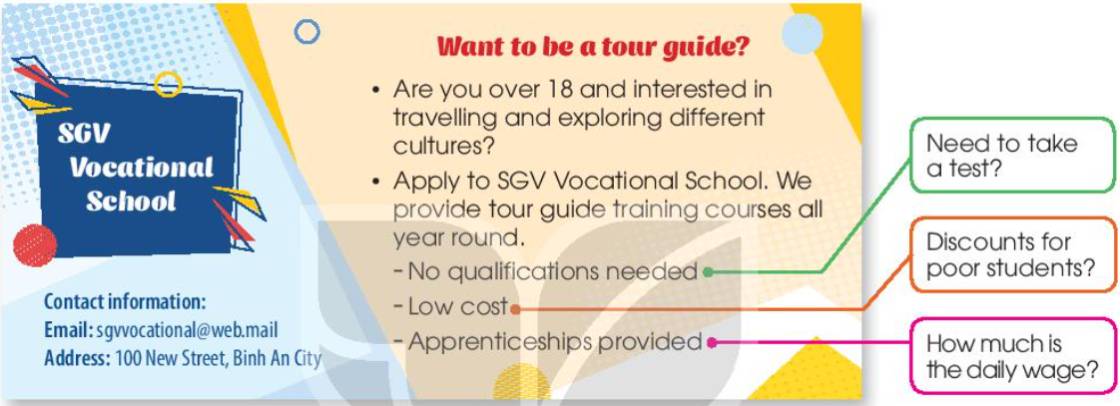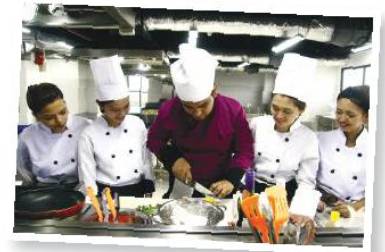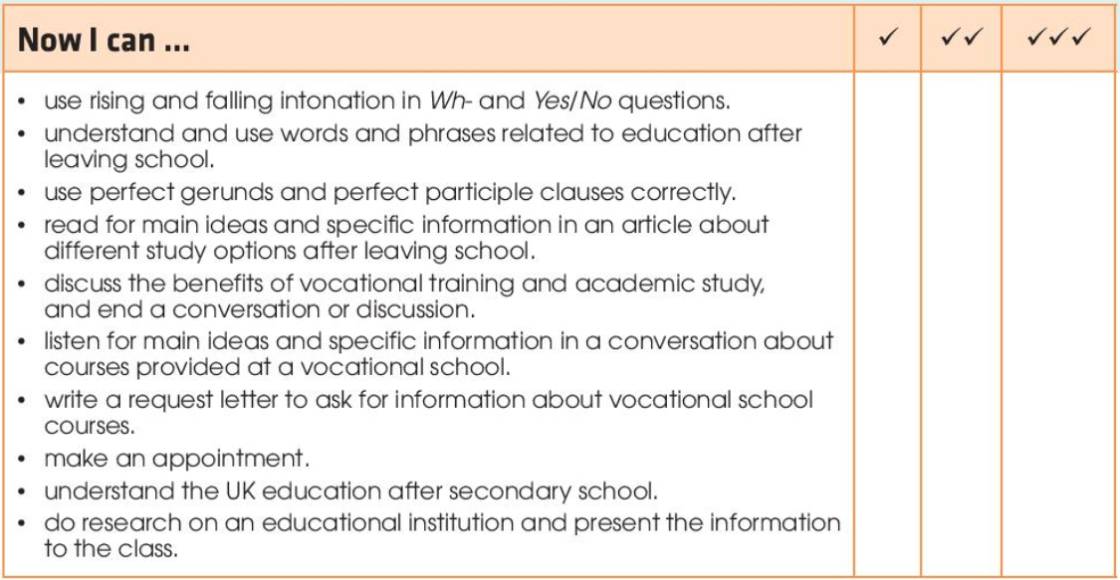Hãy nhập câu hỏi của bạn vào đây, nếu là tài khoản VIP, bạn sẽ được ưu tiên trả lời.

1. education fair
2. entrance exam
3. academic education
4. vocational school
1: education fair
2: entrance exam
3: academic education
4: vocational school

1. months
2. Professional
3. restaurant cooks
4. apprentice
5. (school) brochure

1. Could you please tell me if there is a test requirement to enroll in the tour guide training courses?
(Xin cho biết để đăng ký tham gia khóa đào tạo hướng dẫn viên du lịch có phải thi sát hạch không?)
2. I would like to know if SGV Vocational School offers any discounts for students who are financially disadvantaged.
(Tôi muốn biết Trường dạy nghề SGV có giảm giá cho học viên có hoàn cảnh khó khăn không?)
3. I would appreciate it if you could tell me the daily wage for the apprenticeships provided by SGV Vocational School.
(Tôi sẽ đánh giá cao nếu bạn có thể cho tôi biết mức lương hàng ngày cho việc học nghề do Trường dạy nghề SGV cung cấp.)

1. Based on the context of the picture, it seems like the students are taking a vocational course in cooking or culinary arts.
2. It's possible that students may need certain qualifications or prerequisites to apply for this course, such as a high school diploma or previous experience in cooking. However, it ultimately depends on the specific requirements of the course and the institution offering it.
3. Students in this course likely expect to learn various cooking techniques and recipes, as well as gain a deeper understanding of the culinary arts. They may also learn about food safety, kitchen hygiene, and restaurant management if the course covers those topics. Additionally, students may hope to gain hands-on experience in cooking and receive feedback on their dishes from their instructor. Overall, the goal of this course is likely to help students develop their skills and knowledge in the culinary field.

I agree with the writer's general opinion because of four reasons:
- Vocational courses are more focused on specific job skills, which may limit a student's opportunities if they change their career goals later on.
- Traditional courses often offer a broader education and more opportunities to explore different subjects, which can be valuable for personal growth and future career prospects.
- It can be difficult for students to know exactly what they want to do when they are still in school, so choosing a vocational course may be too restrictive.
- Pursuing a course that really interests you can be more fulfilling and motivating than focusing solely on job prospects.

1. Founded in 1906, the Vietnam National University, Hanoi is a non-profit public higher education institution located in the urban setting of the large metropolis of Hanoi. It is a medium-sized coeducational Vietnamese higher education institution.
2. Vietnam National University, Hanoi (VNU) offers courses and programs leading to officially recognized higher education degrees such as bachelor's degrees, master's degrees and doctorate degrees in several areas of study.
3. VNU also provides several academic and non-academic facilities and services to students including a library, study abroad and exchange programs, as well as administrative services. the cost of yearly tuition can vary widely depending on the Vietnam National University, Hanoi's program of study, the specific type of degree, the student's residency status and other criteria. Moreover, tuition is just one component of the overall cost of attending university. Other expenses, such as room and board, textbooks and personal expenses can add significantly to the total cost of attendance and depends on Vietnam's cost of living.
4. The acceptance rate range is 20-29% making this Vietnamese higher education organization a very selective institution.



Đáp án B